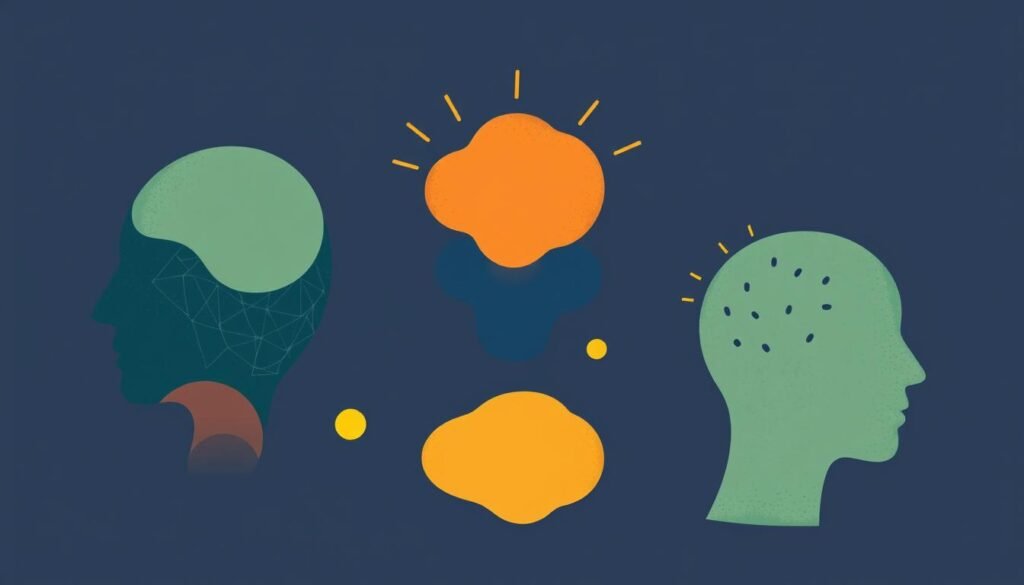Did you know about half of people with generalized anxiety disorder don’t get better with regular treatments? This fact shows we need more effective anxiety relief options. Traditional treatments might take weeks to work. But research shows ketamine therapy might help in just 2 hours. This is exciting news for those fighting hard-to-treat anxiety symptoms. We’ll look at ketamine’s history, how it affects the brain, and the research backing its use for different anxiety issues.
Key Takeaways
- Ketamine has become a viable treatment option for anxiety due to its rapid onset.
- Nearly half of individuals with GAD may not respond to conventional treatments.
- Studies indicate ketamine therapy can deliver noticeable results within hours.
- Higher doses of ketamine demonstrate greater efficacy in alleviating anxiety symptoms.
- Recent research reinforces the safety and effectiveness of ketamine for anxiety disorders.
- Continued exploration into ketamine’s long-term effects is crucial for optimizing treatment.
An Overview of Ketamine Therapy
Ketamine therapy offers new hope to those with severe depression and anxiety. It’s important to know the ketamine history to understand its development. First used in the 1950s as an anesthetic, its benefits in mental health have now come to light. Research over the years has shown its positive effects on several psychological disorders.
History of Ketamine
The ketamine story started in the 1960s in Belgium, mainly for animal use. By 1970, the FDA approved ketamine for humans, finding a role in the Vietnam War to help injured soldiers. Its fast action in treating mental health issues later caught the attention of doctors.
Traditional Uses and Recent Developments
Ketamine was once known just for surgery. Its traditional ketamine uses are well noted. But now, research shows it can fight treatment-resistant depression. The creation of esketamine, a nasal spray, brings even more uses for this drug in treating anxiety and depression.
Research now shows ketamine helping with major depression, hitting adults and teens hard. Clinics, like those at Columbia University Irving Medical Center, are now focusing on ketamine therapy. They create treatment plans that meet each person’s needs.
For a deeper look into how ketamine is reshaping mental health care, check this valuable resource. Ketamine’s progress in treatment highlights its value in mental health and its power to make a difference for those struggling with severe conditions.
Understanding Anxiety Disorders
Anxiety disorders cover various conditions that challenge those affected. They can greatly affect daily life. It’s key to know about the disorders and how they impact mental health.
Types of Anxiety Disorders
Some common types of anxiety disorders include:
- Generalized Anxiety Disorder (GAD)
- Social Anxiety Disorder (SAD)
- Panic Disorder
- Specific Phobias
- Post-Traumatic Stress Disorder (PTSD)
Each type has different symptoms. For example, generalized anxiety disorder involves a lot of worry. Social anxiety disorder is about fearing social situations. Knowing these differences helps in creating better treatment plans.
The Impact of Anxiety on Daily Life
Anxiety’s impact on life is significant. It affects work, relationships, and well-being. Symptoms like panic, worry, or fearing social settings can make it hard to function.
| Type of Anxiety Disorder | Typical Symptoms | Potential Daily Life Impact |
|---|---|---|
| Generalized Anxiety Disorder (GAD) | Excessive worry, restlessness, fatigue | Difficulty concentrating, irritability |
| Social Anxiety Disorder (SAD) | Fear of social situations, embarrassment | Avoidance of social events, relationship issues |
| Panic Disorder | Sweating, heart palpitations, fear of dying | Avoidance of situations that may trigger attacks |
| Specific Phobias | Intense fear of specific objects/situations | Limitations on travel and social activities |
| Post-Traumatic Stress Disorder (PTSD) | Flashbacks, sleep disturbances, hyperarousal | Impacts on personal relationships, work performance |
Understanding how these disorders affect mental health shows the need for good treatments. Ketamine therapy is now seen as promising. It offers quick relief, especially when other treatments don’t work.

What Is Ketamine?
Ketamine is gaining popularity for treating anxiety disorders. It works uniquely and has caught the eye of both experts and those looking for relief. To understand ketamine, it’s key to know how ketamine works in the brain. Also, the different ketamine administration methods for therapy.
How Ketamine Works in the Brain
Ketamine mainly targets the brain’s glutamate system, crucial for mood regulation. It boosts glutamate levels and activates AMPA receptors. This leads to better synaptic plasticity, helping the brain form new connections. Ketamine cuts through harmful thought patterns often seen in anxiety. Thus, it opens up new ways of thinking, offering hope to those battling anxiety disorders.
Forms of Ketamine Administration
Ketamine comes in various forms, each with its benefits and onset times. Some common ketamine administration methods include:
- IV Ketamine: Known as the fastest and most effective form, IV infusions work quickly, perfect for urgent needs.
- Nasal Spray: Esketamine, a ketamine variant, is easy to use at home and absorbs quickly.
- Intramuscular (IM) Injections: Similar to IV but slower to take effect.
- Sublingual Tablets: A less usual form but offers dosage flexibility.
These ketamine administration methods offer new hope for those seeking different therapies. Especially, since 30% to 40% of anxiety patients don’t find relief in standard treatments. Ketamine provides immediate benefits and has a special way of working, making it key in fighting anxiety disorders effectively.
Ketamine Treatment for Anxiety: Relief Is Possible
Ketamine therapy is now in the spotlight for treating anxiety disorders, such as generalized anxiety disorder (GAD) and social anxiety disorder. It provides fast relief, making it a good choice for people who haven’t benefited from usual anxiety treatments.
Effectiveness for Generalized Anxiety Disorder (GAD)
Studies show ketamine is a hopeful choice for those with severe anxiety. About 30% to 40% of patients don’t get better with usual treatments. This shows a big need for new options. After just an hour of taking ketamine, many felt their anxiety lessen, making it a quick solution for relief.
Further studies found that ongoing treatment with ketamine improved how well people did at work and in social settings. This supports the view that ketamine has major benefits in treating GAD.
Benefits for Social Anxiety
Ketamine has also been effective for social anxiety disorder (SAD). Nearly 60% of patients with both SAD and GAD saw improvements after treatment, which was much better than those who didn’t get ketamine. The speedy effects of ketamine show it can ease symptoms faster than traditional treatments.
With symptoms often easing within hours, ketamine is a key choice for quick relief. It is becoming important in the fight against symptoms of both GAD and SAD. This adds to the larger discussion on how community support can help deal with anxiety. Accessing mental health resources and finding supportive communities can help too. For more about community support, visit this link.

| Treatment Type | Time to Relief | Effectiveness |
|---|---|---|
| Traditional Medications | 2-6 weeks | 30-40% treatment resistance |
| Ketamine Therapy | Within 1-2 hours | Up to 60% response in SAD |
Research on Ketamine and Anxiety
Recent studies shed light on how ketamine helps with anxiety disorders. It’s showing promise in ways other drugs haven’t. Scientists note ketamine offers quick relief and is safe to use.
Recent Scientific Findings
In studies on PTSD and GAD, ketamine has shown encouraging progress. For instance, it improved anxiety scores better than placebos in most trials. Among patients with social anxiety, about 29% saw their symptoms halve.
For those with SAD and GAD, 60% found ketamine effective, unlike the placebo group. No improvement was seen there.

Ketamine’s success varies. Single doses might not work for everyone. However, increasing doses given weekly have proven effective. An oral ketamine trial for those with anxiety and depression showed all participants responding well.
Comparative Effectiveness with Traditional Treatments
Ketamine has unique benefits over older drugs like SSRIs. SSRIs take weeks to work, but ketamine acts in hours. Higher doses of ketamine have led to more anxiety reduction. Continued treatment keeps the anxiety away, helping people daily.
Ketamine stands out for many facing anxiety disorders, especially those not helped by other treatments. It’s becoming a key option for them.
Types of Ketamine Treatments Available
Ketamine therapy has grown a lot lately, giving people many options. Each method has its own benefits. This makes it key for patients to learn about them. That way, they can pick the best treatment for themselves.
Intravenous (IV) Infusions
IV ketamine treatment is the top choice for many and is widely studied. By going straight into the blood, it works fast. This allows for exact dose control. Results often start in minutes. It’s great for those tough-to-treat depressions, anxiety, and pain.
Patients get their treatment in a safe clinic. Medical pros watch over them to make sure they’re okay. This makes the process secure.
Studies show IV ketamine helps over 70% of patients. The benefits can last days or weeks after one session. Some might feel nausea or dizzy, but these side effects are brief.
Nasal Sprays and At-Home Options
Nasal spray ketamine is easier to get than IV treatments, working in 15 to 30 minutes. Clinics watch over patients, ensuring a safe treatment. It has few side effects and often is covered by insurance. This makes it a strong choice.
Looking for convenience? At-home ketamine like tablets might be for you. They take longer to work and aren’t as strong as shots, but are handy. Mixing different methods can give a personalized care plan. Ketamine offers a lot for mental health. For more details, check this comprehensive guide on ketamine treatments.
Potential Benefits of Ketamine Therapy
Ketamine therapy offers hope for those dealing with anxiety disorders. It’s becoming a popular choice for those seeking fast relief. This is especially true for people who haven’t had success with other treatments.
Rapid Onset of Relief
Ketamine therapy works quickly, which many patients appreciate. Some notice a big drop in their anxiety within hours. This fast response is crucial for dealing with severe anxiety. It helps improve their mental state right away. The ability to quickly reduce anxiety is why many turn to ketamine therapy.
Long-Term Impact on Anxiety Symptoms
The benefits of ketamine therapy go beyond just immediate relief. Research shows it can help reduce anxiety symptoms over the long term. Many people find their anxiety symptoms stay low after treatment. Ketamine therapy benefits may last because it changes brain connections. This could lead to better emotional health and a higher quality of life. With this therapy, people can enjoy life more, without the weight of anxiety.
Risks and Side Effects of Ketamine Treatment
Ketamine therapy can help with anxiety but has possible risks and side effects. Side effects like nausea, dizziness, confusion, and a feeling of being disconnected happen often. They usually go away quickly but need careful watching. High blood pressure can also occur, especially risky for those already with hypertension.
Common Side Effects
People treated with ketamine may face several physical and mental effects. They might see or feel things that aren’t there, feel restless, or have a changed sense of reality. These issues raise concerns about becoming dependent or having withdrawal if used a lot. Doctors watch patients closely to prevent dependence and make sure dosages are correct. Knowing about ketamine contraindications is key for a safe treatment.
Considerations for Special Populations
Some people should be extra careful with ketamine. This includes those pregnant, breastfeeding, or with a past of drug abuse. Also, people with uncontrolled high blood pressure or psychosis have more risks. These individuals must talk to their doctors about whether ketamine is right for them. It’s all about making sure the benefits outweigh the risks.